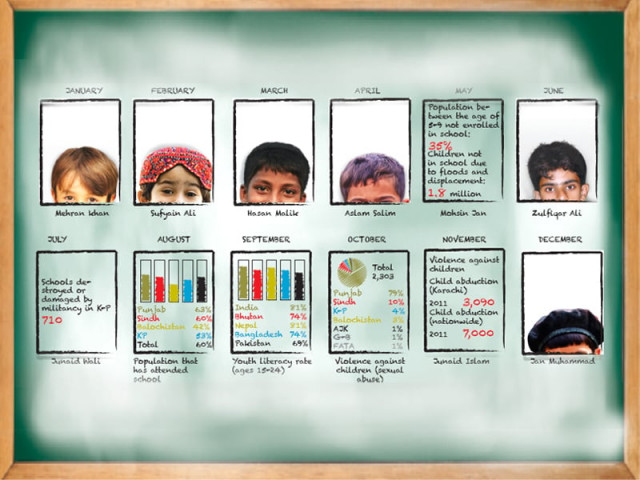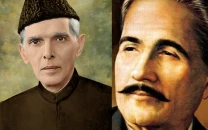Bane of society: ‘Around 10m school-going kids worked as labourers in 2011’
SPARC report reveals inaction on part of govt perpetuated an abysmal state of children in Pakistan.

Child labour remained rampant in the country in 2011, with an estimated 10 million children working as labourers in 2011 as opposed to the 3.3 million in 1996.
A staggering 35% (seven million kids) of the population aged five-nine years was not enrolled in schools in 2011 and almost half of the school-going children in Pakistan have not completed primary education, a child rights group’s report revealed.
According to the report on the state of children in Pakistan by the Society for the Protection of the Rights of the Child (Sparc), not much progress was made in 2011 with regards to legislation for the rights of children. The passing of the 18th Constitutional Amendment was cited as the main reason, under which child rights became a provincial subject.
While nothing substantial was implemented on the national level, even the provinces failed to implement any reforms related to the protection of children with the exception of Sindh, the report claimed. In Sindh, the Child Protection Authority Act, 2011 was passed however, the provincial government failed to implement it.
Only the Federally Administered Tribal Areas (Fata) was successfully able to introduce the Fata Child Protection Policy and banned corporal punishment in schools through a notification.
Last year’s floods left over 2.4 million children in the country vulnerable — with no access to safe drinking water, sanitation or health care.
The report lamented the fact that Pakistan remained the only country in the world where reported cases of polio virus had increased. From a point of almost achieving its eradication target in 2005, polio cases increased from 28 to 86 in 2009. The year 2010 was no different, with cases rising to 142 and reaching close to 200 the next year, 2011.
The report said that in 2012, the International Monetary Fund advised the government to take immediate measures to address its economic issues, since growing financial constraints were forcing children to leave home in search of work.
It added that the absence of a reliable up-to-date statistical information base was a major hindrance in formulating policies and legislation to address the contentious issue of child labour.
Sparc’s Balochistan chapter Regional Manager Hanif Khan Panezai said on Wednesday: “The recent floods in Jaffarabad, Nasirabad, Jhal Magsi and other areas of Balochistan have posed grave threats – especially with the outbreak of water and vector-borne diseases whereby stagnant water pools have become breeding grounds for mosquitoes.”
Panezai feared that there might be a drastic decline in school attendance rates, particularly among girls, after floods in eastern Balochistan. He recalled that complaints resulting from the 2011 floods were aggravated when the donor community failed to provide adequate financial and humanitarian support. However, he conceded that high rates of malnutrition were prevalent in parts of Balochistan even before the flooding in 2010, 2011 and 2012.
The Sparc report highlighted various child-related issues the country faced in 2011, including the damages caused by flash floods, child trafficking sexual abuse, forced marriage, bonded labour, and so on.
“In 2011, a total of 2,303 instances of sexual abuse were recorded from various parts of the country and the number of acid attacks rose from 65 to 150. Latest statistics also reveal that 24% of women between 20-24 years were married before the age of 18 years,” Panezai said.
“The floods alone affected 4.8 million people, half of them children,” he said, adding that a delay in the emergency response caused delays in the transfer of relief aid.
He stated that these issues call for a multi-pronged approach that amalgamates educational awareness initiatives with policy level interventions to counteract culturally and socially-entrenched issues relating to children.
Published in The Express Tribune, October 5th, 2012.



















COMMENTS
Comments are moderated and generally will be posted if they are on-topic and not abusive.
For more information, please see our Comments FAQ